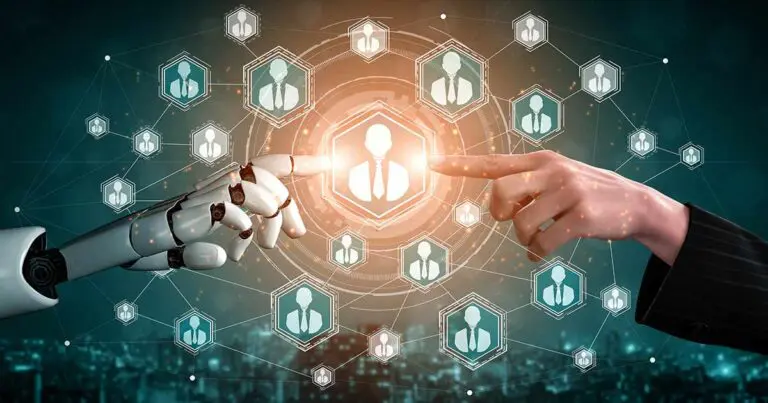The Impact of AI on Human Resources: Opportunities and Challenges

The rapid adoption of artificial intelligence (AI) technologies is transforming various industries, and human resources (HR) is no exception.
Understanding the dual impact of AI on HR practices is crucial for leveraging opportunities while navigating challenges.
Explore the opportunities and challenges AI presents to HR and how businesses can maximize benefits and mitigate risks.
What is AI in HR?
AI in HR refers to the application of artificial intelligence technologies to automate and enhance various HR functions, from recruitment processes to performance management.
By leveraging machine learning and natural language processing (NLP), HR teams can streamline operations, gain valuable insights, and improve employee satisfaction.
Opportunities presented by AI in HR
Opportunities presented by AI in HR include streamlined recruitment processes, enhanced employee experience, and data-driven decision making.
Streamlined recruitment processes
Automated resume screening: AI algorithms can quickly scan and filter resumes, saving time and reducing bias. This enhances the efficiency of the hiring process, ensuring that qualified candidates are identified swiftly.
Candidate matching: AI tools match candidates to job roles based on skills, experience, and cultural fit. This improves the recruitment process by ensuring the selection of the ideal candidate profile for each position.
Enhanced employee experience
Personalized onboarding: AI-driven onboarding systems provide personalized training and support, improving new hire integration. This makes the onboarding process smoother and more engaging for new employees.
Employee assistance chatbots: AI-powered chatbots handle routine HR inquiries, providing instant support and freeing HR professionals for more strategic tasks. This use of AI-driven chatbots enhances the overall employee experience by addressing routine tasks efficiently.
Data-driven decision making
Predictive analytics: AI can analyze employee data to predict turnover, performance issues, and other trends, enabling proactive HR strategies. These data-driven insights are crucial for effective workforce planning and employee retention.
Talent development: AI tools identify skill gaps and recommend personalized learning paths for employees, facilitating continuous development. This supports the development of employees and addresses skills gaps effectively.
Challenges of integrating AI in HR
Challenges of integrating AI in HR include data privacy and security, AI bias and equity, and balancing the human element in HR.
Data privacy and security
Sensitive information: Handling large volumes of employee data increases the risk of data breaches and privacy violations. Ensuring employee privacy is a significant concern for HR teams.
Compliance issues: Ensuring AI systems comply with data protection regulations such as GDPR is critical but challenging. This involves navigating complex cybersecurity risks and maintaining regulatory compliance.
AI bias and equity
Algorithmic bias: AI systems can unintentionally perpetuate existing biases if not properly managed and audited. This can affect fairness in decision-making and needs constant monitoring.
Fairness in decision making: Ensuring AI-driven decisions are fair and transparent requires ongoing oversight and adjustment. Maintaining human intelligence in HR decision-making processes is essential.
Balancing the human element in HR
Balancing automation and human touch: Over-reliance on AI may erode the personal touch in HR, which is essential for employee engagement and satisfaction. Striking a balance between automation solutions and human interaction is critical.
Employee trust and acceptance: Gaining employee trust in AI systems is crucial, requiring clear communication and involvement in the implementation process. This ensures that AI solutions are accepted and effectively utilized by employees.
Strategies for successful AI integration in HR
Strategies for successful AI integration in HR include developing a clear AI strategy, ensuring ethical AI use, and focusing on employee involvement.
Develop a clear AI strategy
Define objectives: Clearly outline what you aim to achieve with AI in HR, aligning it with business goals. This strategic insight ensures the alignment of AI initiatives with organizational priorities.
Choose the right tools: Select AI tools that best fit your organization’s needs and have a proven track record in HR applications. This involves evaluating a wide range of AI-powered tools for effectiveness.
Ensure ethical AI use
Bias mitigation: Implement measures to detect and mitigate biases in AI systems. This is essential for maintaining fairness and equity in HR processes.
Transparency and accountability: Maintain transparency in how AI decisions are made and establish accountability mechanisms. This can build trust and ensure the responsible use of AI in HR.
Focus on employee involvement
Change management: Involve employees in the AI implementation process to ensure smooth adoption and address concerns. This approach enhances employee acceptance and engagement.
Continuous training: Provide ongoing training for HR professionals and employees to effectively use AI tools and understand their impact. Regular training sessions ensure everyone is equipped to leverage AI effectively.
Real-world AI in HR examples
AI in HR is already making a significant impact in various organizations.
From automating repetitive tasks to providing real-time insights into employee performance and employee sentiment, companies are leveraging AI to enhance their HR functions.
Examples include the use of AI-powered chatbots for benefits administration and AI-driven solutions for performance reviews and talent management.
How AI is changing HR jobs and task automation
AI is transforming HR roles by automating time-consuming tasks and enabling HR professionals to focus on strategic initiatives.
Tasks such as payroll processing, benefits plan management, and candidate sourcing are increasingly handled by AI, allowing HR teams to concentrate on more critical thinking and strategic activities.
By embracing AI, HR leaders can enhance efficiency, improve employee satisfaction, and make more informed decisions.
However, to ensure successful integration, it is crucial to address potential risks, such as data privacy and AI bias.
To get the most out of this technology, businesses are encouraged to conduct an AI readiness assessment and start with pilot projects to test AI applications in HR.
Looking to hire top-tier Tech, Digital Marketing, or Creative Talent? We can help.
Every year, Mondo helps to fill over 2,000 open positions nationwide.
More Reading…
- 7 Benefits of Cross-Training Employees: Examples & Best Practices
- How to Build A Successful AI Team in Your Organization
- How to Prepare for Routine Task Automation in the Workplace
- 6 Strategies for Managing IT Project Scope Creep
- How To Answer “What Are Your Salary Expectations?” in an Interview
- 3 Benefits of Building a Culture of Continuous Learning in Your Workplace
- How to Answer “How Do You Define Success?” with Interview Sample Answers
- Top 5 Ways to Build Brand Loyalty Through Social Media
- How Artificial Intelligence is Transforming Supply Chain Management
- AI Overwhelm & 3 Things You Can Do Now to Get Started
- AI You Didn’t Realize Your Organization Is Already Using



